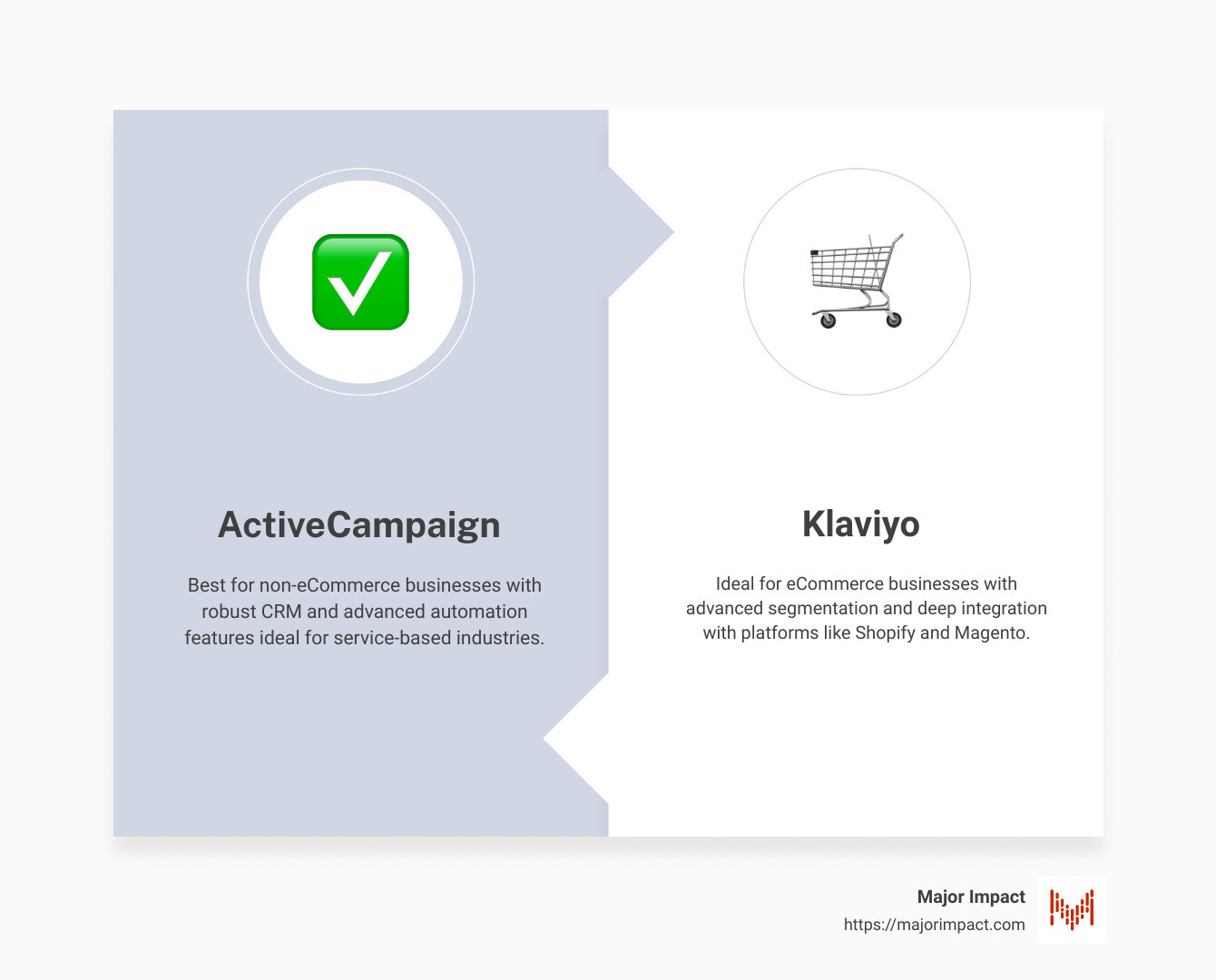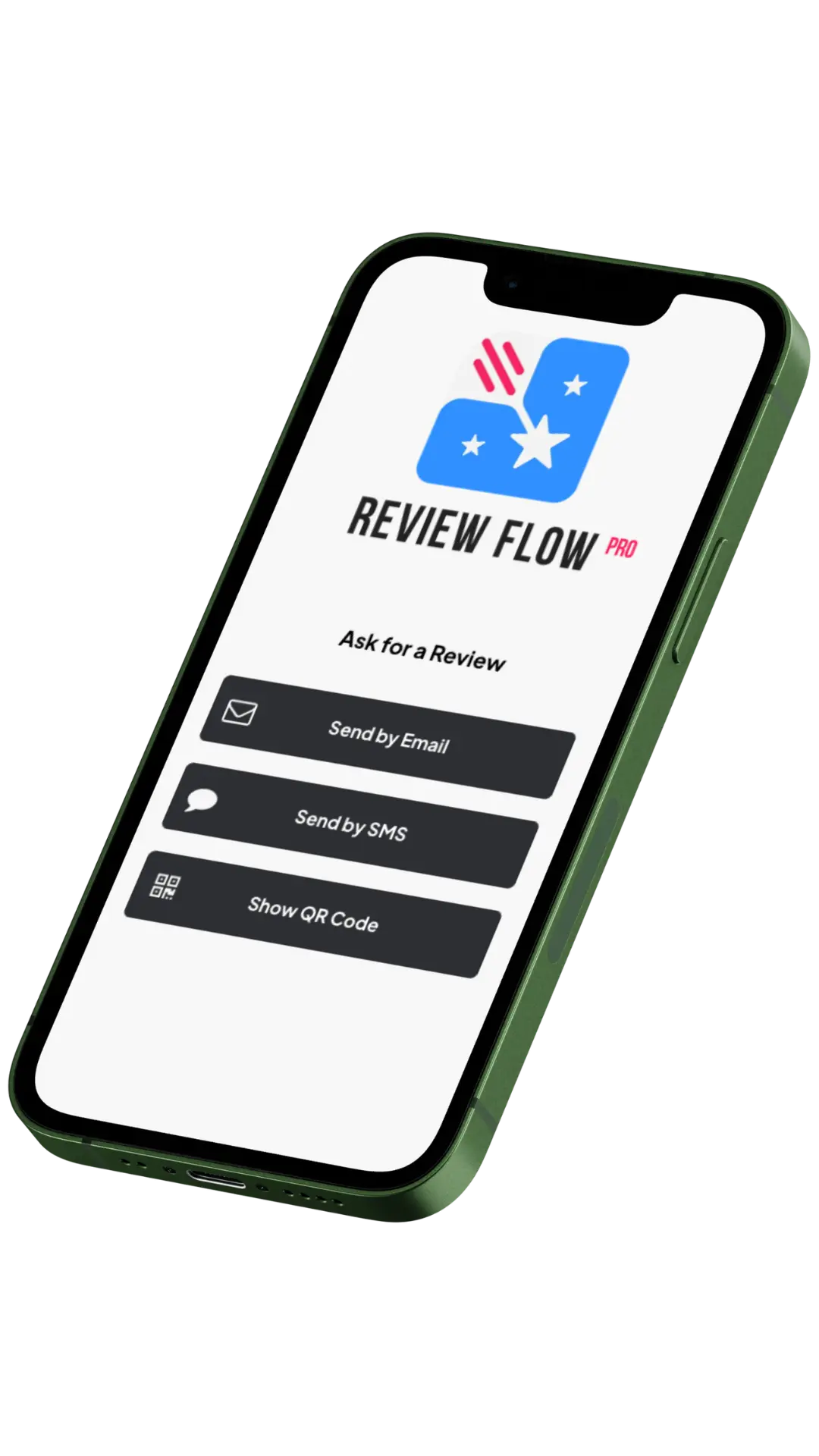Table of Contents
When it comes to choosing between ActiveCampaign vs Klaviyo for your email marketing needs, it all boils down to your business type and objectives. Don’t have time to sift through the details? Here’s the quick answer:
- ActiveCampaign is best for non-eCommerce businesses, offering robust CRM and advanced automation features ideal for service-based industries.
- Klaviyo is the go-to for eCommerce businesses due to its advanced segmentation and deep integration with platforms like Shopify and Magento.
Email marketing is a cornerstone for businesses aiming to build strong customer relationships and drive sales. A well-executed email marketing strategy can elevate your brand, increase customer engagement, and ultimately boost your revenue stream. Choosing the right platform is vital to harnessing these benefits effectively.
About the Author
I’m Elliott Kosmicki, an expert in email marketing platforms including ActiveCampaign vs Klaviyo. With decades of experience in web design, development, and SEO, I’ve helped numerous businesses navigate the complex landscape of digital marketing.
Continue reading to dive deeper into the features, pros, and cons of both platforms.
ActiveCampaign Overview
Key Features of ActiveCampaign
ActiveCampaign is a comprehensive marketing automation platform designed for businesses of all sizes. It combines email marketing, marketing automation, and CRM functionalities into a single, user-friendly platform.
Advanced Automation: One of ActiveCampaign’s standout features is its advanced automation capabilities. You can create complex workflows with triggers based on user behavior, such as website visits or email clicks. This allows for highly personalized and timely interactions with your audience.
Segmentation: ActiveCampaign makes segmentation simple and powerful. You can create dynamic segments based on up to 20 conditions, such as location, engagement history, and more. This helps you target specific groups with tailored messages, increasing the relevance and effectiveness of your campaigns.
Templates: The platform offers a variety of email templates that are both beautiful and functional. These templates can be customized to match your brand, making it easy to create professional-looking emails without needing a designer.
CRM Integration: ActiveCampaign includes a built-in CRM that helps you manage customer relationships directly within the platform. This integration allows you to track customer interactions and automate follow-ups, ensuring that no lead falls through the cracks.
SMS Marketing: In addition to email, ActiveCampaign supports SMS marketing. You can send text messages as part of your automation workflows, providing another channel to engage with your audience.
Pros and Cons of ActiveCampaign
Pros:
- Fantastic Sales and Marketing Automation Capabilities: ActiveCampaign excels in creating detailed and complex automation sequences that can save you time and improve your marketing efficiency.
- User-Friendly Contact Segmentation: The platform’s segmentation options are easy to understand and use, allowing you to create highly targeted groups.
- Detailed Reports: ActiveCampaign provides comprehensive reporting, helping you understand the performance of your campaigns and make data-driven decisions.
- Wide Range of Third-Party Integrations: With over 700 app integrations, ActiveCampaign can connect with almost any tool you already use.
- Free Migration: If you’re switching from another provider, ActiveCampaign offers free migration services to make the transition seamless.
Cons:
- No Free Plan: Unlike some competitors, ActiveCampaign does not offer a free plan, which might be a drawback for smaller businesses with limited budgets.
- Rather Expensive: The platform can be pricey, especially if you need advanced features like eCommerce integrations, which are only available on higher-tier plans.
- Learning Curve: Due to its extensive features, there might be a bit of a learning curve when you first start using ActiveCampaign.
Pricing:
ActiveCampaign’s pricing starts at $19/month for up to 1,000 contacts on the Starter plan, which includes basic features like email templates and segmentation. However, to access eCommerce integrations and more advanced features, you’ll need the Plus plan, starting at $59/month for up to 1,000 contacts.
User Experience:
ActiveCampaign is known for its intuitive interface, despite the initial learning curve due to its extensive features. Users appreciate the drag-and-drop email builder and the visual automation workflow editor, which make it easy to design and implement complex marketing campaigns. The platform’s robust help documentation and customer support further enhance the user experience.
Continue reading to explore Klaviyo’s features, pros, and cons, and see how it stacks up against ActiveCampaign.
Klaviyo Overview
Klaviyo is widely regarded as the ultimate email marketing platform for eCommerce businesses. If you’re running an online store, Klaviyo might be the tool you’ve been looking for. Let’s dive into its key features, pros, and cons.
Key Features of Klaviyo
eCommerce Focus: Klaviyo is designed specifically for eCommerce. It integrates seamlessly with platforms like Shopify, Magento, and BigCommerce. This makes it easy to sync your store data and create targeted campaigns.
Integrations: Klaviyo offers easy integration with most eCommerce platforms. It’s particularly known for its superior integration with Shopify, making it a favorite among Shopify store owners.
User Experience: Klaviyo boasts an easy-to-use interface with a clean and minimalist design. The email editor is intuitive, making it simple to create beautiful emails without any design skills.
Automation: Klaviyo’s intelligent automation features are top-notch. You can set up automated email flows based on customer behavior, such as abandoned cart reminders, welcome series, and post-purchase follow-ups.
Segmentation: Advanced segmentation is one of Klaviyo’s strongest features. You can create dynamic segments based on customer behavior, purchase history, and engagement levels.
Templates: Klaviyo offers a variety of high-quality email templates. These templates are designed with best practices in mind, helping you create effective campaigns quickly.
Analytics: Klaviyo provides powerful reporting and analytics tools. You can track key metrics like revenue generated, open rates, and click-through rates. The platform also allows you to build custom dashboards to monitor your performance.
SMS Marketing: Klaviyo includes SMS marketing options, allowing you to reach your customers through text messages. This feature is integrated into the same platform, making it easy to manage both email and SMS campaigns.
Pros and Cons of Klaviyo
Pros:
– Built for eCommerce: Klaviyo’s features are tailored for online stores, making it ideal for eCommerce businesses.
– Superior Shopify Integration: If you use Shopify, Klaviyo’s integration is unmatched.
– Easy to Use: The clean interface and intuitive email editor make it user-friendly, even for beginners.
– Advanced Segmentation: Klaviyo’s segmentation capabilities are powerful and flexible.
– Comprehensive Analytics: Detailed reporting helps you understand your campaign performance and make data-driven decisions.
Cons:
– Not Ideal for Service Businesses: Klaviyo is best suited for eCommerce and may not be the best option for service-based businesses or physical stores.
– Pricing: Klaviyo can be expensive, especially as your contact list grows. However, all features are available on every plan, which can justify the cost for many businesses.
Pricing Structures and Plans
Klaviyo offers a free plan that includes up to 250 contacts and 500 email sends per month. This is perfect for small businesses or those just starting out. Paid plans start at $30/month for up to 500 contacts and 5,000 email sends. Unlike ActiveCampaign, Klaviyo includes all features in every plan, so you don’t need to upgrade to access advanced tools.
For businesses that also want to leverage SMS marketing, Klaviyo’s Email and SMS plan starts at $35/month, including 1,250 SMS/MMS credits.
Users love Klaviyo for its ease of use and the powerful tools it offers. The platform’s integration with eCommerce platforms, especially Shopify, is seamless and adds significant value. The intuitive design and robust help documentation make it accessible, even for those new to email marketing.
Next, we’ll dive into a detailed comparison of ActiveCampaign vs Klaviyo, focusing on automation, segmentation, integrations, analytics, and pricing.
ActiveCampaign vs Klaviyo: Detailed Comparison
Automation and Segmentation
Automation is crucial for email marketing. ActiveCampaign and Klaviyo both offer robust tools, but they cater to different needs.
ActiveCampaign calls its automations “recipes.” You can create highly customizable workflows for post-purchase, abandoned carts, welcome emails, and more. It also allows up to 20 conditions for each segment, giving you granular control over your campaigns.
Klaviyo refers to its automations as “flows.” Klaviyo’s flows are user-friendly and tailored for eCommerce. You can easily set up automations based on customer behaviors like product views and cart additions. Although Klaviyo has fewer templates, its ease of use makes it a favorite among eCommerce businesses.
Ease of Use: Klaviyo wins here for its simplicity. ActiveCampaign offers more customization but has a steeper learning curve.
Integration with eCommerce Platforms
Integrations are vital for seamless operations. Both platforms integrate with major eCommerce systems like Shopify, WooCommerce, Magento, and BigCommerce.
ActiveCampaign offers these integrations on its Plus plan and higher. While it integrates well, the data sync isn’t as comprehensive as Klaviyo’s.
Klaviyo excels in eCommerce integrations. It provides real-time data sync and backfill, making it easier to track customer behaviors and purchase history. This is particularly beneficial for creating targeted campaigns.
Customization: Klaviyo stands out with its real-time data sync and detailed customer activity tracking.
Analytics and Reporting
Analytics help you measure success and make data-driven decisions.
ActiveCampaign offers comprehensive reports covering metrics like click-through rates and open rates. It also tracks customer journeys across multiple touchpoints, including social media. This makes it ideal for businesses needing detailed insights.
Klaviyo focuses on eCommerce metrics. You can track how different customer groups respond to campaigns and see revenue generated, retention rates, and lifetime customer value. Klaviyo also offers predictive metrics to help forecast future behaviors.
Metrics: ActiveCampaign offers broader analytics, but Klaviyo’s eCommerce focus provides more actionable insights for online stores.
Pricing Structures and Plans
Pricing can be a deciding factor for many businesses.
ActiveCampaign does not offer a free plan but has a 14-day free trial. The Lite plan starts at $29/month, and prices can go up to $259/month for enterprise features.
Klaviyo offers a free plan for up to 250 contacts. Paid plans start at $35/month. This makes Klaviyo more accessible for businesses just starting out.
Value for Money: Klaviyo provides a free plan and more affordable entry-level pricing, making it a better option for small eCommerce businesses.
Next, we’ll answer some frequently asked questions about ActiveCampaign vs Klaviyo.
Frequently Asked Questions about ActiveCampaign vs Klaviyo
Is Klaviyo better than ActiveCampaign?
It depends on your business type.
Klaviyo excels for eCommerce businesses. Its automation flows, like cart abandonment emails, are tailored for online stores. The platform’s segmentation capabilities are particularly robust. You can create segments like “customers who bought red shirts last month and opened emails three times.” This level of detail is invaluable for targeted marketing.
ActiveCampaign, on the other hand, shines for non-eCommerce businesses. Its advanced automation recipes and CRM features make it a versatile tool for various industries. With over 850 integrations, including Salesforce and WordPress, it’s highly adaptable.
Who is ActiveCampaign best for?
ActiveCampaign is ideal for businesses that need advanced analytics and data-driven marketing. If your business relies on detailed customer journeys and lead tracking, ActiveCampaign’s CRM features will be beneficial.
Its automation tools are powerful and customizable, making it suitable for companies with complex marketing needs. For example, you can set up if/else statements and dynamic paths based on user interactions.
Can you use ActiveCampaign as a CRM?
Absolutely.
ActiveCampaign combines email marketing with CRM functionalities. This means you can manage customer relationships and track leads all in one place. The platform allows you to build detailed customer journeys, from initial contact to conversion.
Flexibility is a strong point. You can customize your CRM workflows to fit your business needs. Whether you need to track sales, manage customer support, or automate follow-ups, ActiveCampaign can handle it.
Conclusion
When it comes to choosing between ActiveCampaign vs Klaviyo, the decision largely depends on your specific business needs. Both platforms offer powerful features, but they cater to different types of businesses.
ActiveCampaign shines with its advanced automation, robust CRM capabilities, and extensive reporting options. It’s an excellent choice for businesses that need detailed customer journeys and sophisticated segmentation.
Klaviyo, on the other hand, is built specifically for eCommerce. Its dynamic product feeds, revenue-focused dashboard, and seamless eCommerce integrations make it a powerful tool for online stores.
Choosing the right email marketing platform can be a game-changer for your business. Whether you opt for ActiveCampaign or Klaviyo, make sure it aligns with your business goals and integrates smoothly with your existing systems. And remember, we’re here to help you every step of the way.








